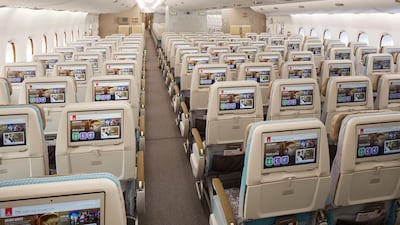Emirates SkyCargo marked a year since it started transporting cargo in the cabins of its planes.
In the past 12 months, more than 3,100 flights were used to carry more than 11,000 tonnes of goods, filling the equivalent of 800,000 aircraft seats.
The demand for vital cargo to be transported around the world in 2020 came to a crunch point when countries closed their borders and airlines stopped passenger flights.
Normally the hold of each passenger aircraft carries travellers’ luggage alongside commercial cargo.
As international travel ceased, the demand for vital kit such as personal protective equipment and other medical supplies became urgent, particularly during the first wave of the pandemic.
European countries including Italy and the UK ran short of PPE in April 2020.
Emirates SkyCargo quickly responded to the demand, and the freight division adjusted its operating model to load selected goods in the cabins of its Boeing 777-300ER planes.
In 10 aircraft, all the seats were removed from economy class.
In the others, once the hold was full, cargo was loaded on to seats and in overhead bins.
Emirates SkyCargo had to rapidly develop a set of procedures to ensure the operation was efficient, safe and secure.
It developed coverings to protect passenger seats and interiors, and a smart calculator application to help global teams work out the optimal loading capacity.
PPE and medical equipment can be transported in smaller boxes than many other items, meaning it is comparatively easy to handle in a confined space such as a plane cabin.
Other general cargo including garments and clothing, dry food, dental supplies and sporting goods were also transported on seats.
One year on, Emirates SkyCargo says there is significant demand for the in-cabin service among its connections, which include more than 135 cities.






